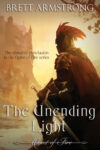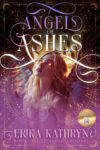Christian Speculative Fiction: Complaining Or Buying
Last week Stephen Burnett ran an excellent article about Christians pirating ebooks. I wonder if there isn’t another problem we as believers have. Do we enjoy complaining about the lack of Christian speculative fiction, or are we doing what little we can when we see a problem?
I’m thinking first and foremost about Christians who read and enjoy speculative literature. Spec Faith was founded, lo these 15 or so years ago, as a response to editors and agents saying over and over that there was no market for Christian science fiction and fantasy. Of course there’s no market if there’s no one putting out books for people to buy, a group of us asserted. So we determined to help create a thirst for Christian speculative literature.
Fast forward, and we have a very different book environment now. Self-publishing is easier than at any time before, an impressive array of small presses, led by Enclave Publishing, have cropped up to fill a void, some specializing on “clean” speculative stories, and others looking for ones specifically written from a Christian worldview. Add in the fact that some of the traditional Christian publishing houses have decided that there is more market for Christian speculative stories than they thought. On top of this, a number of writers have taken the challenge of writing stories from their Christian worldview and seeking publication from general market houses.
 We see all those options represented here at Spec Faith. When we run Fiction Friday excerpts, for example, readers can be introduced to a book published by Tor Teen such as we ran Friday—Stormrise by Jillian Boehme. Or we might put forward a Christian supernatural suspense (with humor) published by a small press (Enclave Publishing) such as we did in Paul Reginer’s Paranormia or a traditional fantasy such as Emily Golus’s Escape to Vindor (Taberah Press). We’ve also featured a self-pubbed award-winner such as Sally Apokedak’s The Button Girl (technically, a Weekday Fiction Fix post) and books such as Jill Williamson’s Safe Lands series published by a traditional Christian house (Bethany).
We see all those options represented here at Spec Faith. When we run Fiction Friday excerpts, for example, readers can be introduced to a book published by Tor Teen such as we ran Friday—Stormrise by Jillian Boehme. Or we might put forward a Christian supernatural suspense (with humor) published by a small press (Enclave Publishing) such as we did in Paul Reginer’s Paranormia or a traditional fantasy such as Emily Golus’s Escape to Vindor (Taberah Press). We’ve also featured a self-pubbed award-winner such as Sally Apokedak’s The Button Girl (technically, a Weekday Fiction Fix post) and books such as Jill Williamson’s Safe Lands series published by a traditional Christian house (Bethany).
I could give numerous examples of each type of book, brought into being despite the idea that there is no market for speculative fiction among Christian readers.
But to be honest, I wonder if book sales numbers support the idea that yes, Christians do want to read speculative fiction. I know there are more and more books available. I don’t know how well they sell. How many people are eager to learn about new books, especially ones that receive good reviews from a reputable and unbiased source such as Lorehaven Magazine.
Are we willing to support the works we said we wanted? Or are we content with point out how difficult it was to get publishers to see Christians who love speculative stories?
I personally don’t have a lot of money, so I can’t buy all the books I’d like. I don’t have time to read a lot of the books I already have, so there’s that problem, too. But what about award-winning books? Wouldn’t it be important to find out about the books that receive recognition from various well-established sources?
I remember approaching a Christian bookstore worker once, asking why they didn’t have a Christy Award winning book. I mean, ought they not carry the best books, first and foremost?
We readers should ask the same question. Do we buy books just because of author name recognition I personally believe that’s why some authors continue to sell well—readers haven’t heard of the other authors and don’t want to risk putting money down for an unknown. But award winners should not be unknowns. I mean, some set of judges chose that particular book over other books as the best of that year. The best of those books entered, yes, but still, a top book, no matter how you look at it.
But I wonder if we might get stuck defending Christians writing and reading fantasy. We discuss from time to time here at Spec Faith what pastors have got wrong when they stand against speculative writing. We talk about the value of Christian fantasy or the need for Christians to write for the general market or how self-publishing allows Christians to be both Christians and lovers of speculative stories, without apology.
Are we buying those books? Are we following through and putting our money and our time to the thing we claim is important, that has been under-represented?
Not every book, certainly. But some people are passionate about Christians writing for the general market. So have they bought books by Merrie Destafano, R. J. Anderson, N. D. Wright? Have they pre-ordered Stormrise that is debuting next month? I could go on and on with titles and authors.
I don’t know how those books are selling, to be honest. Maybe Christians are getting behind them and making them best sellers and I just haven’t heard about it. I’d like to think that’s the case, and not that we love to complain but aren’t doing some little part, like buying a book now and them, reading and leaving reviews, and telling others about the books of speculative fiction written by Christians that we’ve been reading.
























I believe the only hope for Christian fantasy to sell well comes from marketing it as secular fantasy. Until some significant cultural norms are finally destroyed once and for all (maybe 20 years from now).
But yes, I am purchasing and reading Christian fantasy. Even though I’m a slow reader with limited reading time.
Another potential question is whether Christians actually do desire Christian fiction but don’t like the particular Christian fiction books that are out on the market. Years ago, the answer would have probably been yes, but as time goes on and more Christian fiction becomes available, the answer is probably starting to become ‘no, there is quite a bit of good Christian fiction out now’.
Honestly, though, just because a book wins an award doesn’t keep it from being an ‘unknown’. In many ways it’s more likely to be a decent book, but there are still a lot of individual readers that probably won’t like it. The overall quality of the book may be decent, but that doesn’t mean the writing style, plot, etc. is going to hit home for nearly everyone. So a reader might feel like it’s an unknown in the sense that they personally may not like it.
But some of this is a matter of whether or not bookstores know these books exist, too. And where are they made available? If Ingram is where a lot of bookstores purchase books from, not having books available through Ingram reduces a book’s chances of being sold in actual stores and thus getting noticed more. I’m thinking about using Blurb books because not only do they have their own online store, but they distribute print books to both Amazon and Ingram.
I do want to read and buy a lot of Christian books, but time and finances do work against me a bit on that one. I do try and keep an eye out for books to add to Christmas wishlists and whatnot, though. Also, I was in a Barnes and Noble recently, and as usual their Christian Fiction section is pathetically small, so with a lot of mainstream stores like that it’s a vicious cycle of ‘we don’t carry Christian fiction because not enough people buy it, but few people buy it because there isn’t a good selection’
I think a lot of us are mostly broke and busy, make it hard to invest time or money into finding authors and trying new books. When I was just working part time, I used to get a lot of free Kindle books — some of them were terrible, but some were actually really good, and I would purchase sequels on sale.
Now my lunch break is my reading time, and I really don’t want to stare at a screen. So I mostly read library books. I will search out my favorite authors, but I’m less likely to try something new at this stage in my life. I was persuaded to buy the mermaid series by Catherine Jones Payne after her article was featured here. Really glad I did!
And if I could find out what name Anne Elisabeth Stengl is writing under now, I would buy those books in a hearbeat. Her Goldstone Wood series won many awards, but she didn’t sell enough to keep writing and supporting her family.
Yeah, I think she said she didn’t think her newer (darker) stories would be accepted by her existing reader base. But I would have been really interested to at least look into her newer stuff. I understand her decision, but feel slightly disappointed and curious.
Yes, I remember reading that too. But I like dark, so I’m insanely curious!
The announcement is still up on the Goldstone site. I nosed around the internet a little to see if I could find her books, but nothing. I don’t know if she was planning to market to a traditional press or put them out herself. It is frustrating, because I agree that she’s a talented writer.
Over the past 4 years i’ve purchased about 15 Christian speculative books, most mentioned on SpecFaith, and read (or at least started to read) all of them. At best, i found them enjoyable but not memorable, and at worst they bored me to death, with nonsensical plots and bland characters i did not care about. Not one of them would rank in my top 10 or even 20 of books i’ve read, though one or two might make my bottom 20. I would love to see more Christians succeeding as authors of speculative fiction, but it’s hard to invest time and money in a direction that has disappointed me over and over again.
This of course makes me curious as to what your top 10 or 20 books are. I think if I saw those, I’d be able to recommend a Christian writer you might like better than the ones you mentioned.
But I do think there’s a fair level of mediocrity among Christian books–though I’ve read some authors I’d say were genuinely good (though truly great? not so much).
An abbreviated list, arranged alphabetically by author’s name because trying to assign value judgments is a never-ending exercise in futility:
1 Watership Down – Richard Adams
2 Shardik – Richard Adams
3 Jane Austen novels
4 Jane Eyre – Charlotte Brontë
5 Most Agatha Christie mysteries
6 Jonathan Strange and Mr. Norrell – Susanna Clarke
7 The Hunger Games trilogy – Suzanne Collins
8 The Kite Runner – Khaled Housseini
9 A Thousand Splendid Suns – Khaled Housseini
10 Howl’s Moving Castle – Dianna Wynne Jones
11 Most things by C.S. Lewis
12 The Visitation – Frank Peretti
13 The Oath – Frank Peretti
14 Going Postal – Terry Pratchett
15 Thud! – Terry Pratchett
16 Pretty much everything by Brandon Sanderson
17 I Capture the Castle – Dodie Smith
18 Pretty much everything by Tolkien
19 First 3 Queen’s Thief books by Megan Whalen Turner
20 The Raven Cycle by Maggie Stiefvater
In fairness, there’s a fair level of mediocrity among general market books, too. The really outstanding writers, Christian or no, ate not a dime a dozen.
Becky
Never said (or meant to imply) all general market books were better. There’s plenty of those on my bottom 20, too. But even without a comparison to general market fiction, the ratio of Christian books i liked to ones i did not is discouraging, especially when the best ones rank as “tolerable time-waster” and the worst as “that was awful”. It does not encourage me to pick up another Christian speculative fiction book, no matter how well-reviewed or awarded.
I have long been a reader of science fiction/fantasy/speculative fiction. In answer to Becky’s question, yes, I do buy books (in Kindle format and as my retiree budget allows) In fact, counting the list of non-fiction titles I’m also interested in, I have QUITE a long list of Kindle samples I hope to fully purchase someday!!
And, as a retired public librarian whose duties sometimes included book selection/purchase, may I remind everybody that there’s a LOT of stuff published (in other genres, for example) that is just ‘meh.’ Yes, even the stuff that makes it into the big bestseller lists! Name recognition and big PR $$$ can accomplish a lot. Most of the (published &/or aspiring) authors who participate here are all too aware of this.
So true! Thanks for adding that note. There’s also the fact that not every book is for every person. For example, some of Sarah Parks’ list above would not be on any list of mine. The classics, yes (though if she’d picked the other Brontë sister, I would have said, Not for me) and some of the more contemporaries. But not all. Honestly, I haven’t read a contemporary book that I can grab hold of and say, Oh, my, this is the best book I’ve ever read! But I’ve read a lot of good ones. Enjoyable ones. Some that made me cry or think deeply. Some that I try to remember and can’t. Just today saw a sale for a book in a series, and I thought, did I read that book? I remember the series, but that particular book, not at all. I put a lot of stock in recommendations, especially from sources that I know have tastes similar to mine. So I think talking about books is really, really good.
Becky
I just stumbled across this blog–I love spec fiction, whether it’s fantasy (my fav), supernatural suspense, (second fav) or sci-fi…I’ve even read a paranormal romance (Christian, believe it or not) that I loved. I appreciate the discussion here and I’m going to follow this blog. Rebecca, I believe we met at the SoCal conference?
I hope this is ok to post? It’s not my book but one I read and loved and that is winning awards. “The Awakened” A book Book by Richard Spillman–is free through Sept. 7th on Kindle and the audio book just came out. I love the narrator. I’m including a link to the first 15 min so you can check out the narrator and story. It’s a supernatural, international suspense/thriller with very strong reviews…some saying they compare his writing and the story to Peretti. https://youtu.be/TzWuAO9K4x0 via @YouTube
I LOVED this book! Here’s the link to Amazon for the ebook or print in case you’re interested. https://amzn.to/2ZwKKCx You also get a 60% reduction in price on the audio book if you get it at the same time as the free ebook!! And book two, The Ascension, just released, and it’s only $2.99 during this same time period, then it goes up.
I’m like some here who said you don’t have much time to sit and read. I rarely do, so I listen to audio books when I’m driving, doing yard work, housework, etc. I’d LOVE recommendations on good fantasy in audio if anyone has any? I even started a Christian/clean audio group on FB, hoping to find recommendations and stir discussion, as I couldn’t find a group like that already in existence.
I look forward to reading more that’s posted here and I’m glad I found you!